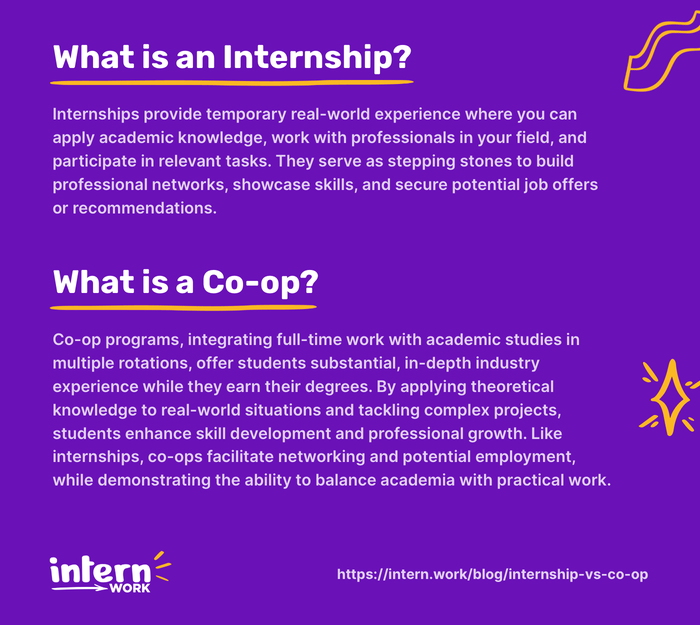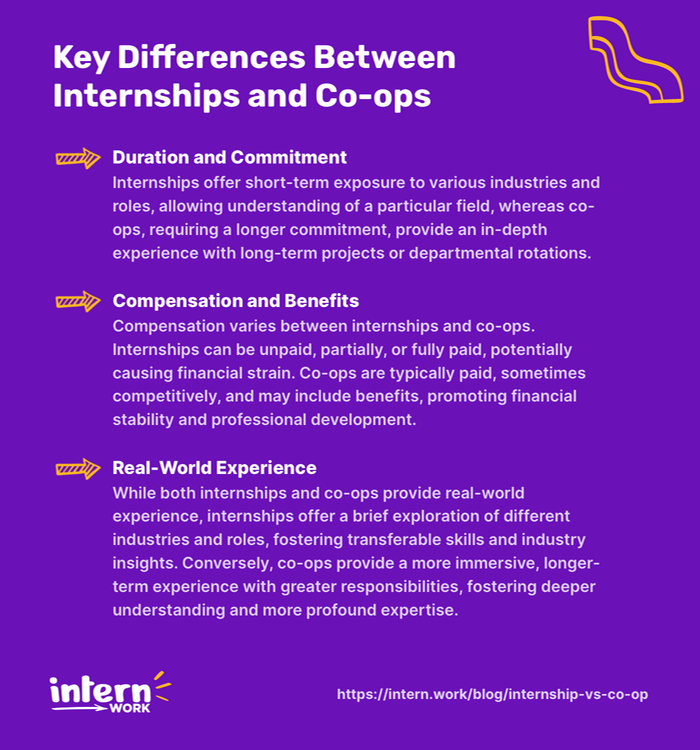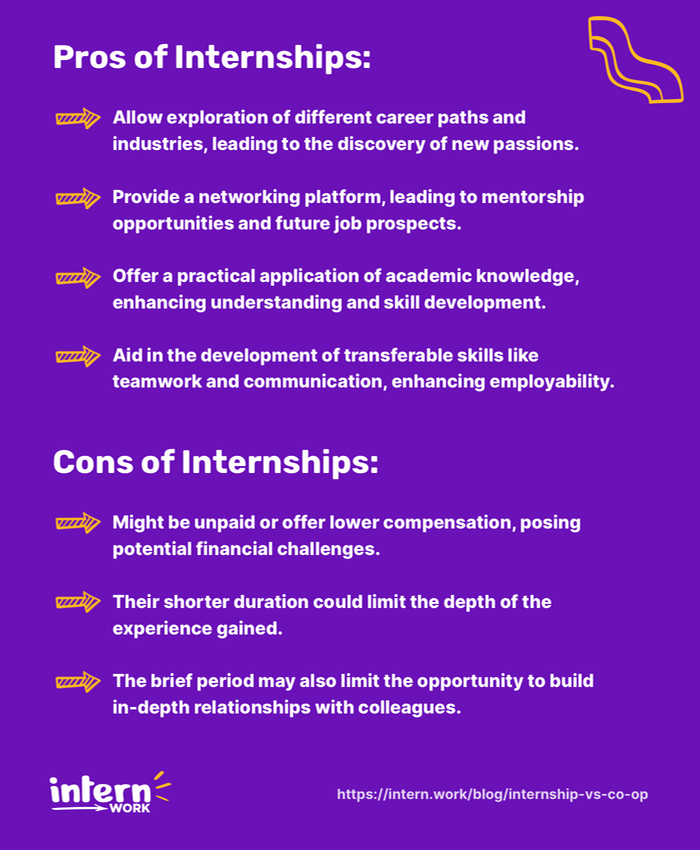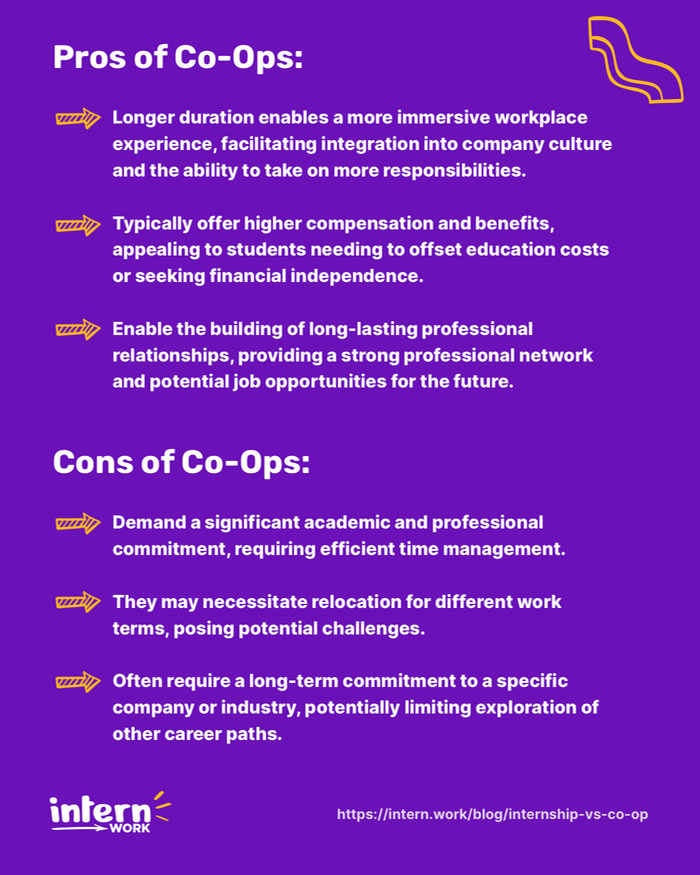
Deciding between an internship and a co-op can be a tough choice. Both options offer valuable experiences and opportunities for growth. So, how do you know which path is right for you? Let’s break it down and explore the basics.
What is an Internship?
An internship is a temporary work experience that typically lasts a few months. It allows you to gain practical skills and apply your classroom knowledge in a real-world setting. Internships are often offered by companies, organizations, or non-profits.
You can work alongside professionals in your field of interest during an internship. This hands-on experience allows you to observe and participate in various tasks and projects relevant to your chosen career. It is a valuable opportunity to learn from experienced individuals and gain insights into the industry.
Internships can be a stepping stone toward building your professional network. Working closely with professionals allows you to establish connections and create relationships that may benefit future job opportunities. Additionally, internships will enable you to showcase your skills and work ethic, potentially leading to a job offer or a strong recommendation for future employment.
What is a Co-op?
A co-op, short for cooperative education, is an extended work experience that integrates full-time work with academic study periods. Co-ops are often structured as multiple rotations, alternating between work and school terms.
Co-op programs allow students to gain substantial work experience while pursuing their degrees. These programs are typically longer than internships, allowing students to delve deeper into their field of study and gain a more comprehensive understanding of the industry.
One of the key benefits of participating in a co-op program is the ability to apply theoretical knowledge gained in the classroom to real-world situations. By alternating between work and school terms, students can directly use the concepts they have learned in their courses, enhancing their understanding and skill development.
Co-op programs often allow students to work on more complex projects and take on greater organizational responsibilities. This exposure to challenging tasks and decision-making processes can significantly contribute to the growth and development of students’ professional skills.
Like internships, co-op programs allow students to network and establish connections within their industry. Students can build relationships with professionals through their work terms and potentially secure future employment opportunities. Employers highly regard co-op programs as they demonstrate students’ ability to balance academic study with practical work experience.

Internships and co-ops are invaluable opportunities for students to gain real-world experience, enhance professional skills, and establish industry connections. While internships provide a shorter-term, intensive insight into a particular field, co-ops offer a more extensive work-study structure, alternating academic terms with full-time work experiences.
Key Differences Between Internships and Co-ops
Regarding gaining practical work experience, internships and co-ops are two popular options for students and young professionals. While both provide valuable opportunities to learn and grow, the two have several key differences.
-
Duration and Commitment
Internships are generally shorter in duration, lasting a few months. This allows students to gain exposure to different industries and roles without making a long-term commitment. On the other hand, co-ops can last much longer, ranging from six months to a year or more, depending on the program and the employer. Co-ops require a more significant commitment of time and energy, as participants are expected to work full-time during their co-op period.
During an internship, you may have the opportunity to work on specific projects or assist with ongoing tasks. This short-term commitment lets you understand what it’s like to work in a particular field and determine if it aligns with your interests and career goals. Co-ops, on the other hand, provide a more in-depth experience, as participants are typically assigned to work on long-term projects or rotations within a specific department or team.
-
Compensation and Benefits
Compensation is a crucial factor to consider when choosing between an internship and a co-op. Depending on the organization and industry, internships can be unpaid, partially, or fully paid. While unpaid internships may offer valuable experience, they can also place a financial burden on students who need to cover their living expenses during the internship period.
On the other hand, co-ops are often paid positions, and some programs even offer competitive salaries. This compensation helps students cover their expenses and provides them with financial stability. Additionally, co-ops may provide benefits, such as health insurance and retirement plans, which can further enhance the overall experience and support the professional development of participants.
-
Real-World Experience
Both internships and co-ops provide valuable real-world experience, allowing participants to apply their academic knowledge practically. However, they differ in terms of the level of immersion and the depth of experience gained.
Internships let you dip your toes into the professional world, allowing you to explore different industries and roles. You may have the opportunity to work alongside experienced professionals, learn about the day-to-day operations of a company, and contribute to meaningful projects. This exposure can help you develop transferable skills, gain industry insights, and build a network of contacts.
Co-ops, with their extended durations, offer a more immersive experience. Participants are fully integrated into the workforce and can take on more significant responsibilities. This extended engagement allows for a deeper understanding of the industry, the company culture, and the specific role in which you are placed. Co-ops enable you to develop more profound expertise, refine your skills, and build more substantial connections within the organization and the industry.

Choosing between an internship and a co-op depends on your goals, preferences, and circumstances. Both options provide valuable learning experiences and can significantly contribute to your personal and professional growth. The skills and knowledge gained through internships and co-ops will shape your future career.
Pros and Cons of Internships
Internships can be a valuable experience for individuals looking to gain practical skills and explore potential career paths. They offer a unique opportunity to immerse oneself in a specific industry and gain hands-on experience. However, like any other endeavor, internships come with their own set of advantages and disadvantages.
Advantages of Internships
One of the main advantages of internships is the opportunity to explore different career paths and industries. Many individuals enter internships with a general idea of what they want to pursue. Still, through their experiences, they may discover new passions and interests. This exposure allows interns to make more informed decisions about their career paths.
Another advantage of internships is the chance to network and build professional connections. Interns are often allowed to interact with professionals in their chosen field, which can lead to mentorship opportunities and future job prospects. These connections can be instrumental in securing future employment or obtaining valuable recommendations.
Internships also provide the opportunity for practical application of academic knowledge. While classroom learning is essential, internships allow individuals to apply what they have learned in a real-world setting. This hands-on experience enhances their understanding of the subject matter. It helps them develop practical skills that will benefit their future careers.
Furthermore, internships offer the chance to develop transferable skills like teamwork and communication. Working professionally alongside other interns and employees provides valuable experience in collaborating with diverse individuals. Employers highly seek these skills and can significantly enhance an individual’s employability.
Disadvantages of Internships
Despite the numerous advantages, internships also have disadvantages that individuals should consider. One of the main concerns is that internships may be unpaid or provide lower compensation compared to full-time positions. This can pose financial challenges for individuals who rely on income to support themselves during their internship.
Another disadvantage is the shorter duration of internships, which may limit the depth of experience gained. Interns often have a limited timeframe to learn and contribute to the organization, which can restrict their ability to fully immerse themselves in projects or initiatives. However, it is important to note that short-duration internships can provide valuable insights and learning opportunities.
Additionally, interns may have less opportunity to build in-depth relationships with colleagues than full-time employees. As interns are typically part of the organization for a shorter period, forming strong connections with coworkers can be challenging. However, interns can still network and engage with colleagues during their time, maximizing the relationships they establish.
Overall, internships offer a range of advantages and disadvantages. It is vital for individuals to carefully consider their goals and circumstances before pursuing an internship opportunity. Individuals can make informed decisions that align with their career aspirations by weighing these pros and cons.

Internships offer opportunities to explore career paths, network with professionals, apply academic knowledge in a real-world setting, and develop valuable transferable skills. Potential disadvantages include shorter duration limiting the depth of experience, and challenges in building stronger relationships due to the temporary nature of the role.
Pros and Cons of Co-Ops
Cooperative education programs, commonly known as co-ops, have gained popularity among students and employers. These programs allow students to gain practical work experience while pursuing their education. Co-ops typically involve alternating periods of work and study, allowing students to apply what they have learned in the classroom to real-world situations. While co-ops have numerous benefits, they also have certain drawbacks that students must consider. Let’s explore the advantages and disadvantages of co-ops in more detail.
Advantages of Co-ops
One of the significant advantages of co-ops is their longer duration, which allows students to have a more immersive experience in the workplace. Unlike internships that usually last a few months, co-op programs can span multiple semesters, giving students ample time to fully integrate into the company culture and take on more substantial responsibilities. This extended duration also allows students to develop more profound expertise in a specific field, as they have more time to work on projects and gain practical skills.
Another advantage of co-ops is the strong potential for higher compensation and benefits. As co-op students are seen as valuable contributors to the company, they often receive competitive salaries and additional perks such as health insurance, retirement plans, and paid time off. This financial aspect can be particularly appealing for students looking to offset their education costs or gain financial independence.
Furthermore, co-ops offer students the chance to build long-lasting professional relationships. Students can network with professionals in their chosen field through work terms, establish mentorship connections, and gain valuable references for future job applications. These relationships can be instrumental in launching a successful career after graduation, as they provide students with a solid professional network and potential job opportunities.
Disadvantages of Co-ops
While co-ops have numerous advantages, there are also some disadvantages that students should consider. One of the main drawbacks is the more demanding academic and professional commitment. Balancing work responsibilities with academic coursework can be challenging, requiring students to manage their time effectively and stay organized. The rigorous nature of co-op programs often means that students must put in extra effort to meet their academic and work obligations.
In addition, co-ops may require students to relocate for different work terms. This can be both a pro and a con, depending on the individual’s preferences and circumstances. Relocation offers the opportunity to experience different cities and work environments, broadening one’s horizons. On the other hand, it may pose challenges such as finding suitable housing, adjusting to a new city, and being away from friends and family for an extended period.
Lastly, one disadvantage of co-ops is the potential need for more flexibility to explore other career options during the program. Unlike internships, which are usually shorter, co-ops often require students to commit to a specific company or industry for an extended period. While this can benefit gaining in-depth knowledge and experience in a particular field, it may limit students’ ability to explore alternative career paths or industries during their co-op program.

Co-op programs offer students a unique opportunity to gain practical work experience, develop professional skills, and build valuable connections. They might come with specific challenges, such as a demanding commitment and potential relocation. The benefits of co-ops, such as longer durations, higher compensation, and networking opportunities, make them a compelling option for students looking to enhance their education and career prospects.
Making the Right Choice: Factors to Consider
-
Your Career Goals
When it comes to making a decision about whether to pursue an internship or a co-op, it’s important to consider your long-term career goals. Take a moment to reflect on where you see yourself in the future and how an internship or a co-op aligns with those aspirations. Suppose you still need to figure out your career path. In that case, an internship can provide broader exposure to different fields and help you better understand what you genuinely enjoy and excel at. On the other hand, if you already have a specific career in mind, a co-op can be an excellent opportunity to develop the necessary expertise and skills that will set you apart in your chosen field.
Imagine yourself in the future, working in your dream job. What skills and experiences would be most valuable in that role? Consider how an internship or a co-op can help you acquire those skills and experiences. By doing so, you’ll be better equipped to make an informed decision that aligns with your long-term career goals.
-
Your Academic Schedule
Your academic schedule is another important factor when deciding between an internship and a co-op. Take a moment to assess your current academic commitments and the flexibility you have with your schedule. Can you realistically balance a co-op’s demanding work hours with your academic workload? Are any specific courses or projects requiring your full attention during certain periods?
It’s crucial to clearly understand how an internship or a co-op will fit into your academic schedule. Suppose you have more flexibility or a structured co-op program integrated into your curriculum. In that case, a co-op might be a good fit. This way, you can ensure that you can fulfill your academic and professional obligations without feeling overwhelmed or compromising the quality of your work in either area.
-
Your Financial Situation
Consider your financial needs and obligations when deciding between an internship and a co-op. A paid internship or co-op might be preferable if you need income to support yourself financially. It’s important to carefully evaluate your financial situation and determine whether you have the means to support yourself during an unpaid internship. Suppose you can afford an unpaid internship or have other sources of financial support. In that case, you may have more flexibility in your decision.
Think about the financial impact of an internship or co-op on your life. Are you comfortable with not earning any income during an unpaid internship? Can you manage your expenses and maintain a reasonable standard of living? These are essential questions to ask yourself when considering your financial situation.

It’s worth considering an internship or co-op’s potential long-term financial benefits. While a paid internship or co-op may provide immediate financial relief, an unpaid internship or co-op can offer valuable experiences and connections that may pay off in the long run.
Key Takeaways
- Internships are generally shorter, providing exposure to different industries without a long-term commitment. Co-ops, however, last much longer and require more time and energy, offering a more comprehensive understanding of the industry.
- Internships can be unpaid, partially paid, or fully paid. In contrast, co-ops are often paid, and some programs offer competitive salaries and benefits such as health insurance and retirement plans.
- Both internships and co-ops offer valuable real-world experience. However, due to their extended duration, co-ops provide a more immersive experience with more significant responsibilities.
- Internships offer flexibility, practical application of academic knowledge, and networking opportunities. Still, they may need more depth of experience and financial benefits. Co-ops provide in-depth knowledge, competitive compensation, and longer duration but require more demanding commitment and may limit flexibility to explore other career options.
- The choice depends on individual career goals, academic schedules, and financial situations. Those unsure about their career path may opt for internships for broader exposure. In contrast, those with a specific career may prefer co-ops for a more focused experience.
Wrapping Up
Ultimately, deciding between an internship and a co-op depends on your circumstances, goals, and preferences. Take the time to reflect on what you want to achieve and what you’re willing to commit to. Contact advisors, mentors, or professionals in your desired field to gather more insights.
Internships and co-ops offer valuable experiences to help you grow personally and professionally. So, remember to embrace the journey, make connections, and learn from every opportunity that comes your way.





